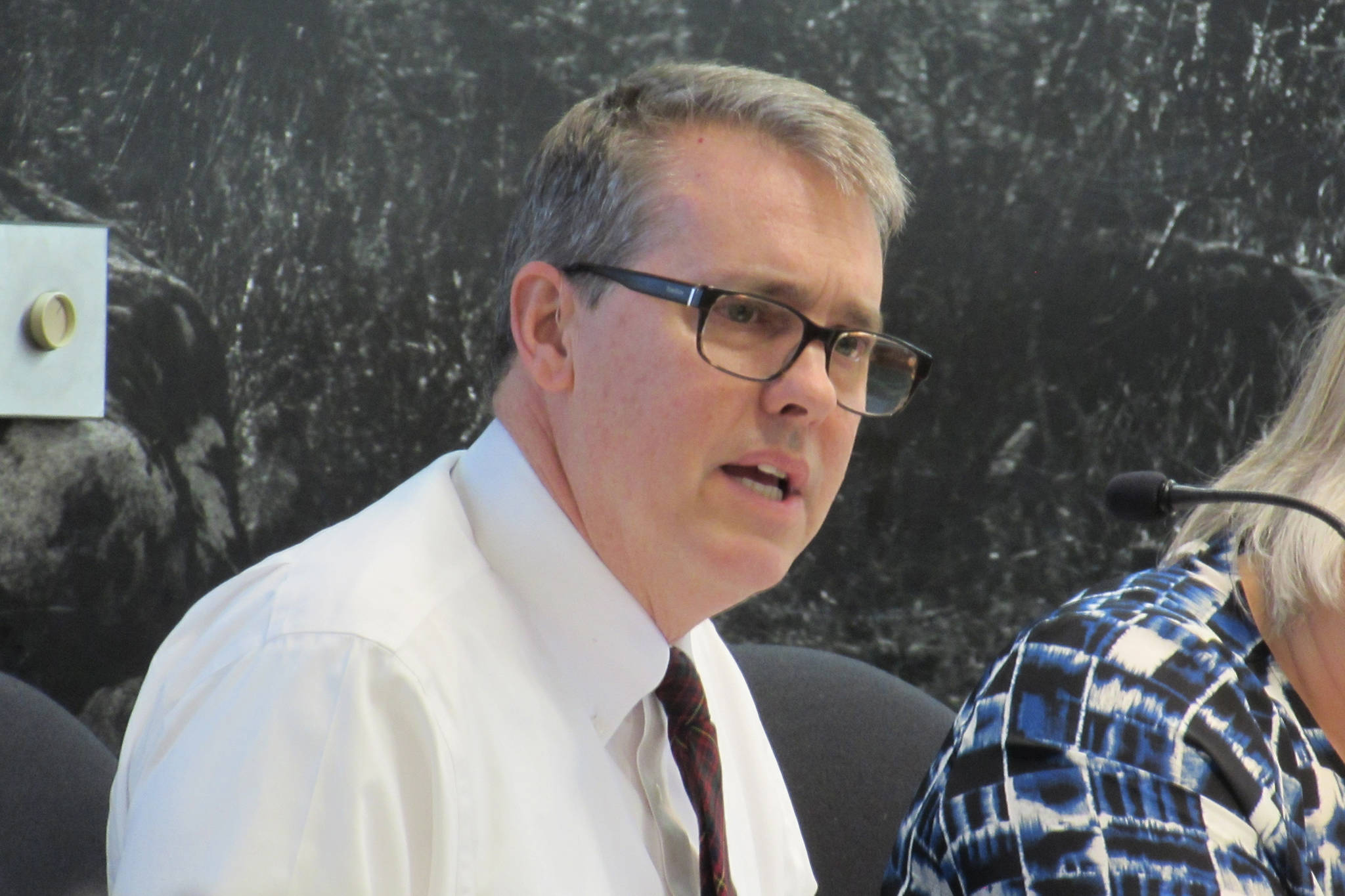Gov. Mike Dunleavy’s proposed budget would mean millions less in state funding heading to City and Borough of Juneau coffers, and city officials aren’t particularly happy about it.
City Manager Rorie Watt detailed ways a year-over-year cut of $7.1 million in school bond debt reimbursement and $400,000 in fish taxes would impact Juneau during a CBJ town hall meeting Monday night.
“This is a big time for Alaska,” Watt said. “Never in the last 40 years has a governor proposed such a radical change to state institutions. Not only are big changes proposed, but detail and reasoning on the impacts is scarce to non-existent. And nobody has proposed any credible process for considering the changes.”
A typical CBJ annual budget is about $100 million, and about half of the revenue for the budget comes from property tax with the other half coming from sales tax, Watt said.
[Budget cuts could be implemented over multiple years]
School bond debt is a program that allows municipalities to renovate eligible schools by reimbursing about 70 percent of the cost if the project is approved by a referendum.
In Juneau’s case, Watt said most of the debt is tied to Sayéik: Gastineau Community School and Auke Bay and Harborview elementary schools.
“That money’s already spent,” Watt said after the presentation.
Options to absorb the proposed 7-percent hit to revenue include burning through savings, raising property taxes 14 percent or eliminating programs, Watt said.
“Realistically, you do all three.”
One aspect of the proposed budget would actually force CBJ to save money at the expense of the Juneau School District.
Watt said federal regulation meant to ensure equality among schools places a cap on the level of funding a municipality can provide a district. Typically, Juneau has funded at or near the cap, Watt said.
If K-12 funding for JSD is cut by $10 million as proposed, the cap on how much CBJ can fund would decrease by $3 million, which effectively turns a $10 million loss into a $13 million loss for the school district.
Last year total city funding was $27.8 million and the district’s budget was $85.8 million, according to the CBJ website.
“I think that’s a tax savings that nobody wants,” Watt said.
[Opinion: With proposed budget, timing is everything]
Juneau Mayor Beth Weldon said that lost school district money would result in fewer educators and larger classroom sizes.
Along with the direct impact the proposed budget would have on CBJ, Watt explained a few cuts that would indirectly impact Juneau in profound ways.
Under the proposed budget, Bartlett Regional Hospital would see a reduction of $6.2 in Medicaid funding.
“Hospitals can’t turn away people in need,” Watt said. “To a large degree, it is very likely people will show up at the emergency room in need of those services.”
In that scenario, Watt said people unable to pay would hurt the hospital’s bottomline and cause other costs to rise to compensate.
Watt also pointed to drastic cuts to spending on the Alaska Marine Highway System and on education as lowlights from the proposed budget.
Both would have impacts on Juneau that Watt said would be difficult to imagine or quantify.
“The economic affects to Juneau would be great — obviously, the university is a big employer,” Watt said. “There are many affects in reduction to university funding that frankly we have no idea what it means.”
“I cannot even begin to imagine what shutting down the ferry system does for the cost of shipping goods, for the viability of bush communities,” he added.
Things people can do
Weldon and Watt reminded those in attendance the proposed budget is, at this point, just a proposal.
“Keep calm,” Weldon said. “Don’t panic, but we want you to engage with your legislators.”
She encouraged those who do reach out to be civil when making phone calls or sending emails.
One reason reaching out to elected officials is important, Watt said, is because the drastic cuts being considered are a matter of choice.
“This is not a budget crisis,” Watt said. “This is a priority crisis. It is a question of how the state can best allocate the funds it has and whether or not to provide new revenue to maintain all the things everybody wants to do.”
He said the state is running a $1.6 billion deficit but $1.9 billion in Permanent Fund Dividend checks are proposed and cuts to education, universities, ferries and more only brings the state budget down by about 2 percent when compared to last year.
[Public testimony on Alaska Marine Highway System and PFD to be heard]
If the governor’s proposed budget or a budget like it is passed, CBJ does have a combined $32 million saved up in a “Rainy Day Fund” and aggregate savings from city employees routinely spending less than budgeted that could help smooth the impact.
“It’s a savings account that I think this Assembly would not plan on using to solve a budget problem that the state can solve,” Watt said.
Also the funds would not replenish quickly enough to be a permanent solution.
During a question and answer session that followed Watt’s presentation, a couple of possible solutions were suggested by those in attendance.
Tracy Hansen, who is pursuing a master’s degree in public administration, said a multi-state lottery governed by an independent lottery board may be a good idea.
Juneau resident and former University of Alaska Southeast Chancellor John Pugh said something needs to be done about out-of-state workers who make money in Alaska, but do not pay taxes to the state.
“We need to expand our tax burdens to a lot of people who in sense rent our state and take all their funds outside,” Pugh said. “I think that we need to start talking about that as municipalities and say enough is enough.”
• Contact reporter Ben Hohenstatt at (907)523-2243 or bhohenstatt@juneauempire.com. Follow him on Twitter at @BenHohenstatt.

